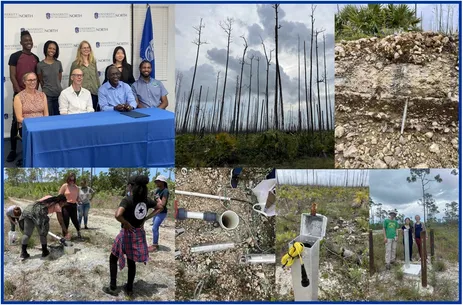Cooperations with the University of the Bahamas (UB) on Grand Bahama, The Bahamas
The island of Grand Bahama, The Bahamas, was struck by the severe hurricane Dorian in 2019. During this event, an intensive storm surge was flooding large parts of the island, including groundwater well fields. The island is characterized by karstic limestones, and fresh groundwater lenses were largely impacted by infiltrating salt water. Drinking water resources were damaged, so that brackish groundwater was desalinated with reverse osmosis (RO) and blended with pumped groundwater (low salt concentrations) for water provision to households.
We are collaborating with the University of the Bahamas (UB) and other local stakeholders, including the Grand Bahama Utility Company (GBUC), for evaluating the current situation of subsurface freshwater lenses, groundwater recharge and quality aspects. Goals are to find sustainable and resilient solutions for drinking water provision on Grand Bahama, where severe hurricanes are expected to occur increasingly frequent and intense, in the future, due to climate change.
Our work includes evaluating the feasibility of managed aquifer recharge (MAR) as a nature-based, resilient and cost-effective way for restoring and sustaining groundwater resources on Grand Bahama. In October 2022, the project “Strengthening of Forests Through Groundwater Restoration (SOFTGR)”, led by UB and funded by the Bahamas Protected Areas Fund (BPAF), was completed successfully. Our investigations addressed the technical feasibility of MAR potentials (Master thesis of Sophia Klausner). Potential MAR methods and reforestation measures were assessed for their ecosystem services and costs and benefits (Master thesis of Carolina Hotta). The latter was in collaboration with the TUM Chair of Hydrology (Francesca Perosa, Prof. Dr. Markus Disse).
In June 2022, we carried out joint fieldwork on Grand Bahama, including the inspection of groundwater wells and the extraction of monitoring data, as well as the installation of soil moisture sensors. Furthermore, we held the joint workshop “Hydrological and ecohydrological challenges on Grand Bahama – Towards sustaining ecosystems and a resilient water supply”. This workshop included scientific discussions and knowledge exchange between different institutions, including not only scientists and engineers, but also many students of UB. Among others, UB, TUM, the California State University Sacramento and the UNESCO were participating. Travel of TUM participants to The Bahamas was funded by the Bayerische Forschungsallianz and the TUM Global Incentive Fund.
We are currently continuing the cooperation, among others by evaluating the hydrogeological and hydrochemical situation, and expected developments, based on data from meteorological stations and groundwater monitoring wells that have been set up by the non-governmental organization IsraAid (Israel). Goals are to improve process understanding and to identify potentials for restoring salt-contaminated freshwater lenses. This does not only affect potential drinking water use, but also the protection of ecosystems, including forests that were heavily damaged due to the seawater flooding.
For this work, we are continuously offering Bachelor and Master theses as well as Study Projects. Please contact us if you are interested. Next project proposals are currently being planned, which will focus among others on groundwater recharge, groundwater flow and saltwater dynamics in groundwater.
Partners
University of the Bahamas (UB); Grand Bahama Utility Company (GBUC); California State University Sacramento (CSUS); IsraAid
Financial Support
Bahamas Protected Areas Fund (BPAF); Bayerische Forschungsallianz; TUM Global Incentive Fund

Responsible
Project duration
August 2021 to October 2022 (SOFTGR) and ongoing
Publications
Papers:
Kristen Welsh, Clare Bowen-O'Connor, Mark Stephens, Zoi Dokou, Anne Imig, Tara Mackey, Andrew Moxey, Efthymios Nikolopoulos, Arno Rein, Amber Turner, Amano Williams, Layla Al Baghdadi, John Bowleg, Henrique Leite Chaves, Ancilleno Davis, Gil Guberman, Danielle Hanek, Sophia Klausner, Dmitry Medlev, Nivea Mazzoni, Ingeria Miller, Latonya Williams, Remington Wilchcombe (2022): Potable Water and Terrestrial Resources on Grand Bahama Post-Hurricane Dorian: Opportunities for Climate Resilience. International Journal of Bahamian Studies 28. dx.doi.org/10.15362/ijbs.v28i0.467
Anne Imig, Sophia Klausner, Kristen Welsh, Carolina Iwane Hotta, Zeko McKenzie, Francesca Perosa, Mark Stephens, Amber Turner, John Thomas, Henrique Leite Chaves, Clare Bowen-O'Connor, Andrew Moxey, Gregg Ward, Arno Rein: Climate change resilience of freshwater supply on small island states: Research gaps and strategies for a case study in Grand Bahama (in preparation)
Anne Imig, Sophia Klausner, Francesca Perosa, Carolina Iwane Hotta, Kristen Welsh, Arno Rein: Holistic assessment of MAR through technical feasibility and extended cost-benefit analysis - An application for Grand Bahama (in preparation)
Conference contributions:
Klausner, S., Imig, A., Welsh, K., Rein, A. (2022): Feasibility of Managed Aquifer Recharge on Grand Bahama. Sustainable Grand Bahama Conference 2022, 7.-9. April 2022.
Hotta, C.I., Perosa, F., Welsh, K., Chaves, H. (2022): Ecosystem services assessment and extended cost-benefit analysis for planned measures in Grand Bahama. Sustainable Grand Bahama Conference 2022, 7.-9. April 2022.
Klausner, S., Imig, A., Welsh, K., Rein, A., (2022) Feasibility of Managed Aquifer Recharge on Grand Bahama. The 11. International Symposium on Managed Aquifer Recharge, 11.-15. April 2022. Long Beach, USA.
Imig, A., Klausner, S., Welsh, K., Rein, A. (2022): Methodology for identifying feasibility of managed aquifer recharge on the example of Grand Bahama. The 11. International Symposium on Managed Aquifer Recharge, 11.-15. April 2022. Long Beach, USA
Organized workshop:
Hydrological and ecohydrological challenges on Grand Bahama – Towards sustaining ecosystems and a resilient water supply. Workshop held on The Bahamas & online, 2 and 9 June 2022. Speakers: Kristen Welsh- Unwala, Clare BowenO’Connor, Mark Stephens and Andrew Moxey, UB; John Bowleg, UNESCO-IHP; Zoi Dokou, CSUS; Carolina Hotta, Anne Imig and Arno Rein, TUM;
